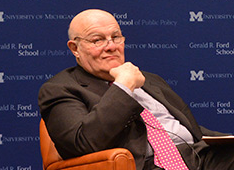Difference between revisions of "Melvyn Levitsky"
(unstub) |
(tidy) |
||
| Line 8: | Line 8: | ||
|death_date= | |death_date= | ||
|death_place= | |death_place= | ||
| + | |interests=war on drugs | ||
|constitutes=Diplomat | |constitutes=Diplomat | ||
|alma_mater= University of Iowa,University of Michigan | |alma_mater= University of Iowa,University of Michigan | ||
| Line 24: | Line 25: | ||
}} | }} | ||
}} | }} | ||
| − | '''Melvyn Levitsky''' is a [[United States]] diplomat and former [[Ambassadors of the United States|United States Ambassador]] to [[Bulgaria]] (1984–87) and [[Brazil]] (1994–98) | + | '''Melvyn Levitsky''' is a [[United States]] diplomat and former [[Ambassadors of the United States|United States Ambassador]] to [[Bulgaria]] (1984–87) and [[Brazil]] (1994–98),<ref name="bio1">[http://fordschool.umich.edu/faculty/Melvyn_Levitsky Biography], [[Gerald R. Ford School of Public Policy]], Retrieved December 2, 2010</ref> before moving over to the [[International Narcotics Control Board]]. |
==Career== | ==Career== | ||
Levitsky has a Bachelor of Arts degree in [[Soviet Studies]] from the [[University of Michigan]] and a Master of Arts degree in Political Science from the University of Iowa. | Levitsky has a Bachelor of Arts degree in [[Soviet Studies]] from the [[University of Michigan]] and a Master of Arts degree in Political Science from the University of Iowa. | ||
| − | + | His early career is dominated by [[Cold War]] diplomatic postings. He was a [[political officer]] at the United States Embassy in [[Moscow]] and Consul at the United States Consulates in Belém, [[Brazil]] and Frankfurt, [[Germany]].<ref>https://web.archive.org/web/20060813111743/http://www.incb.org/incb/en/members_levitsky.html</ref> | |
He was Deputy Director of [[United Nations]] Political Affairs in the Department of State (1980-1982), Deputy Assistant Secretary of State for Human Rights and Humanitarian Affairs (1982-1983, deputy director of the [[Voice of America]] (1983-1984); beforing becoming US ambassador to [[Bulgaria]] in [[1984]]. | He was Deputy Director of [[United Nations]] Political Affairs in the Department of State (1980-1982), Deputy Assistant Secretary of State for Human Rights and Humanitarian Affairs (1982-1983, deputy director of the [[Voice of America]] (1983-1984); beforing becoming US ambassador to [[Bulgaria]] in [[1984]]. | ||
Latest revision as of 01:22, 8 April 2021
(Diplomat) | |
|---|---|
 | |
| Born | 19 March 1938 Sioux City, Iowa |
| Nationality | US |
| Alma mater | University of Iowa, University of Michigan |
| Member of | Global Panel Foundation/Board of Advisors |
| Interests | war on drugs |
Melvyn Levitsky is a United States diplomat and former United States Ambassador to Bulgaria (1984–87) and Brazil (1994–98),[1] before moving over to the International Narcotics Control Board.
Career
Levitsky has a Bachelor of Arts degree in Soviet Studies from the University of Michigan and a Master of Arts degree in Political Science from the University of Iowa.
His early career is dominated by Cold War diplomatic postings. He was a political officer at the United States Embassy in Moscow and Consul at the United States Consulates in Belém, Brazil and Frankfurt, Germany.[2]
He was Deputy Director of United Nations Political Affairs in the Department of State (1980-1982), Deputy Assistant Secretary of State for Human Rights and Humanitarian Affairs (1982-1983, deputy director of the Voice of America (1983-1984); beforing becoming US ambassador to Bulgaria in 1984.
From 1989 to 1993 he served as Assistant Secretary of State for International Narcotics Matters.[3] In 2003, he became a board member of the International Narcotics Control Board.[4]
He is a member of the American Academy of Diplomacy. He is also on the Advisory Board of the Global Panel Foundation[5]
He is against a de facto decriminalization of marijuana, saying in 2013 "the federal government has decided not to enforce federal law making marijuana illegal in the states of Colorado and Washington where recent referenda purportedly legalized marijuana. The implication is varied. The Constitution says federal law is supreme, that means it must be enforced throughout the territory of the United States, and we have the Controlled Substances Act, which declares marijuana illegal throughout the territory."[6]
References
- ↑ Biography, Gerald R. Ford School of Public Policy, Retrieved December 2, 2010
- ↑ https://web.archive.org/web/20060813111743/http://www.incb.org/incb/en/members_levitsky.html
- ↑ (22 August 1989). Colombia May Have Reached Turning Point, Milwaukee Journal Sentinel, Retrieved December 2, 2010
- ↑ INCB Membership: Melvyn Levitsky, Retrieved December 2, 2010
- ↑ http://globalpanel.org
- ↑ https://fordschool.umich.edu/video/2013/melvyn-levitsky-federal-decision-ignore-states-marijuana-legalization-troubling